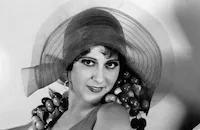The First Auto

Brief Synopsis
Cast & Crew
Roy Del Ruth
Barney Oldfield
Patsy Ruth Miller
Charles Emmett Mack
Russell Simpson
Frank Campeau
Film Details
Technical Specs

Synopsis
Hank Armstrong, an essentially old-fashioned man, is a lover of horses and resents the new invention of the "horseless carriage" for which his son, Bob, has a particular fondness. When his son takes an interest in automobile racing, Hank disowns him and tinkers with a racing car so that it will explode, not knowing his son is to be the driver. Although Bob is not seriously hurt, Hank is cured of his hatred of automobiles, while Bob wins the love of Rose, the girl of his dreams.

Director

Roy Del Ruth
Cast
Barney Oldfield

Patsy Ruth Miller
Charles Emmett Mack
Russell Simpson
Frank Campeau

William Demarest
Paul Kruger
Gibson Gowland
E. H. Calvert
Douglas Gerrard
Crew

Film Details
Technical Specs

Articles
The First Auto
Del Ruth was a mainstay at every studio he worked for (including MGM and 20th Century-Fox), but he's probably best known for his work at Warner Bros., where he labored from the mid-'20s until 1934. He was a major influence on the studio's gritty fast-paced style before the arrival of Production Code enforcement in 1934. Among his most notable films there were the first screen version of The Maltese Falcon (aka Dangerous Female, 1931), which featured blatant depictions of all the sexuality John Huston was only allowed to hint at in his classic 1941 version; the breakneck newspaper comedy Blessed Event (1932); and three films that helped establish James Cagney's tough-guy image, Taxi! (1932), Blonde Crazy (1931) and Lady Killer (1933).
On The First Auto, he worked with a combination of established players, future stars and one tragic might-have-been. Russell Simpson had already made well over 60 films by the time he took on the role of the father clinging to his old-fashioned ways. He would go on to become a member of the John Ford stock company, playing Pa Joad in The Grapes of Wrath (1940) and taking on small roles in Ford's My Darling Clementine (1946), Wagon Master (1950) and The Horse Soldiers (1959). Rose, the girl Simpson's son leaves behind as he rises through the auto industry, was played by Patsy Ruth Miller, already a major silent star, most notably as Esmeralda in Lon Chaney's The Hunchback of Notre Dame (1923). She would retire from acting in 1932. Two years before playing a small role as the village blacksmith in The First Auto, Gibson Gowland had scored his greatest screen triumph, as the doomed dentist McTeague in Erich von Stroheim's legendary Greed (1925). By contrast, William Demarest, cast as the "Village Cut-Up," was still more than a decade away from his greatest screen roles, in such classic Preston Sturges comedies as The Lady Eve (1941), Sullivan's Travels (1942) and The Miracle of Morgan's Creek (1944). In the '60s, he would win a new generation of fans as Uncle Charlie on the family sitcom My Three Sons.
The film's one tragic question mark was Charles Emmett Mack, starring as Simpson's up-and-coming son, who leaves behind the family business and his childhood sweetheart for success in the auto industry. Mack had been making films since 1921, and The First Auto, made when he was only 27, was one of his best roles. What might have followed is anyone's guess, as he only made two more pictures before his death in a car accident on the way to the studio, an ironic end considering his role in The First Auto.
Producer: Darryl F. Zanuck
Director: Roy Del Ruth
Screenplay: Anthony Coldeway, Darryl F. Zanuck (story), Jack Jarmuth (titles)
Cinematography: David Abel
Art Direction: Lewis Geib, Esdras Hartley
Score: Herman S. Heller
Principal Cast: Russell Simpson (Hank Armstrong), Charles Emmett Mack (Bob Armstrong), Patsy Ruth Miller (Rose Robbins), Barney Oldfield (The Old Driver), Gibson Gowland (The Blacksmith), William Demarest (The Village Cut-up).
BW-78m.
by Frank Miller

The First Auto
Quotes
Trivia
Actor Charles Emmett Mack was killed in an auto accident that occurred while he was on his way for shooting of a car chase for this film.
This movie is being preserved by the UCLA Film and Television Archive.














